Bringing Cats and Dogs Back to Life?
From today, it’s possible to bring back our beloved cats and dogs who have passed away, thanks to the revolutionary technology of Gemini Genetics. This groundbreaking biotech company is making headlines with their pet cloning service, which costs between €45,000 and €70,000.
The Science Behind It
The process involves taking somatic cells, which are non-reproductive body cells, from the deceased pet and introducing them into an enucleated egg cell from a donor animal. The resulting embryo is then implanted into a surrogate mother, which carries the cloned pet to term.
Ethical Considerations
The ethics of pet cloning are a subject of ongoing debate. Some argue that it’s an unnatural interference with the natural cycle of life and death, while others believe it’s a way to preserve the legacy of a cherished companion.
The Reality
However, it’s important to note that the cloned pet is not an exact replica of the original. Genetic variations and differences in the environment can lead to subtle differences in appearance, temperament, and health.
The Cost
The steep price tag for pet cloning has raised eyebrows. Critics argue that the money could be better spent on animal welfare initiatives or preventing pets from being euthanized due to overpopulation.
Is It Worth It?
Ultimately, the decision to clone a pet is a deeply personal one. For some, the idea of having a genetically identical companion is a comforting thought. For others, it’s an unnecessary expense. Whatever your perspective, Gemini Genetics is making the impossible possible – bringing our four-legged friends back to life.
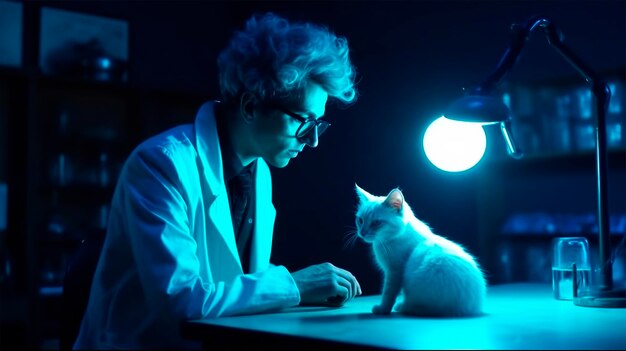
Revolutionizing Pet Ownership: The Advancement of Cloning Technology
Pet cloning technology, once a subject of science fiction and speculation, has now become a reality. With the advent of sophisticated techniques, laboratories like
Gemini Genetics
, a pioneering figure in this field, have made it possible to bring cats and dogs back to life. The process involves extracting the DNA from a pet’s cells and inserting it into an egg cell with no nucleus, which is then implanted in a surrogate mother. The result? A genetic replica of the original pet.
The Magic of Cloning
At Gemini Genetics, they’ve mastered this artful technology, offering pet owners a once-in-a-lifetime opportunity. By cloning, they can preserve the unique traits and characteristics of their beloved companions – a priceless gift that transcends time.
A Hidden Cost: The Price of Immortality
However, this miraculous journey doesn’t come cheap. The cost for such a service can range from $50,000 to even more than $200,000, depending on the specifics of the cloning process. For many pet owners, this investment is a small price to pay for the invaluable comfort and companionship that their cloned pets bring.
Bringing Back Precious Memories
Imagine having another chance to spend precious moments with a cherished companion who has long since passed away. With Gemini Genetics, this dream can become a reality. Their groundbreaking work not only offers solace to those grieving the loss of their pets but also opens up an entirely new dimension in pet ownership – one where love knows no bounds, and memories are forever cherished.

Background of Pet Cloning Technology
Pet cloning, the process of creating genetically identical organisms, has been a subject of fascination and controversy since its inception. The breakthrough in this field came with the cloning of Dolly the sheep in 1996, marking the first mammal to be cloned from an adult cell. This historic event was achieved by a team of scientists at the Roslin Institute in Scotland, using a technique called Somatic Cell Nuclear Transfer (SCNT).
Brief history of pet cloning
Following Dolly’s success, researchers turned their attention towards cloning pets. In 2001, Snuppy the African clawed frog and Scooby the sheep became the first cloned mammals from embryonic cells. However, the most significant achievement was the cloning of pets. In 2005, an Old English bulldog named Snoopy was born as the first cloned dog. Later, other pets like cats, horses, and even mules were successfully cloned using this technique.
Explanation of the cloning process and its challenges in pets
Pet cloning involves a complex procedure, which can be broken down into four primary steps:
Collection and preservation of cells
The first step is to collect somatic cells from the donor animal, typically an adult cell, which undergoes mitosis and forms a new organism. These cells must be kept alive in nutrient-rich media to maintain their viability during the cloning process.
Nuclear transfer into an enucleated egg cell
The second step is the process of nuclear transfer, where the donor nucleus is transferred into an enucleated (nuclei removed) egg cell from a surrogate mother. This process involves fusing the two cells and allowing them to form a diploid zygote, which contains genetic material from both the donor and the surrogate mother.
Embryo implantation in a surrogate mother
The third step is the implantation of the embryo into a surrogate mother, which can carry the clone to term. This is often done using artificial insemination or by transferring the embryo into the uterus of a synchronized surrogate mother.
Birth and development of the clone
The final step is the birth and development of the clone, which occurs naturally like any other animal. However, challenges can arise during this stage due to complications such as large size differences between the clones and their surrogate mothers or abnormalities in development.
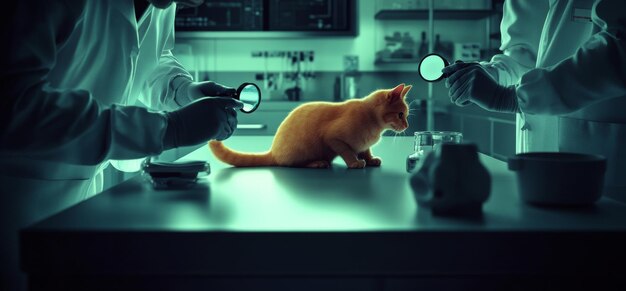
I Introduction to Gemini Genetics
Gemini Genetics, a leading innovator in the field of animal cloning, is a pioneering biotechnology company dedicated to the advancement of genetic research and pet preservation. Founded in 2001, this renowned organization has been at the forefront of creating new life and preserving the legacies of beloved pets through its unique cloning services.
Overview of the company and its mission
With a commitment to scientific excellence and a passion for preserving the bond between humans and their pets, Gemini Genetics offers a rare opportunity to bring back cherished companions who have passed away using advanced genetic techniques.
Description of their pet cloning services
Cats and dogs only
Specializing in the cloning of felines and canines, Gemini Genetics ensures that every clone is a genetically identical replica of its donor pet, offering clients not only an emotional connection but also a chance to witness the continuation of their beloved companion’s traits and characteristics.
Process and techniques used
The cloning process at Gemini Genetics relies on somatic cell nuclear transfer (SCNT) and cryopreservation. SCNT involves transferring the nucleus of a somatic cell, which contains an animal’s genetic information, into an enucleated egg. The resulting embryo is then implanted into a surrogate mother and develops into a genetically identical clone of the donor pet. Cryopreservation, or freezing cells, helps preserve genetic material for future use.
Success stories and testimonials from clients
Emotional attachment to the cloned pets
Countless families have shared heartwarming stories of their love and emotional attachment to the cloned pets, proving that the bond between humans and their companions transcends the boundaries of life and death.
Scientific importance of cloning in pet research
Moreover, the scientific significance of cloning extends beyond personal connections as it offers valuable insights into various health conditions and genetic disorders in pets. With advancements in this field, research can lead to improved understanding, prevention, and treatment of these ailments, ensuring the wellbeing and longevity of future generations.
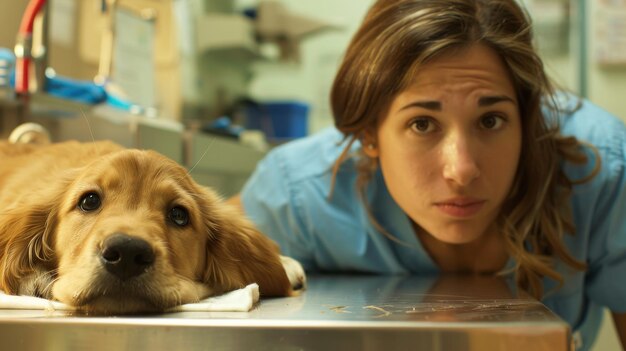
Controversies and Ethical Concerns Surrounding Pet Cloning
Discussion of Animal Welfare Issues
Pet cloning, the process of creating genetically identical animals through nuclear transfer technology, has been a subject of intense debate and ethical concerns since its inception. One of the primary issues revolves around animal welfare. Critics argue that the cloning process can cause significant suffering and psychological impact on the animals involved. The technique often requires multiple attempts, resulting in a high mortality rate among embryos and cloned animals. Moreover, the process itself can result in various health issues and abnormalities due to epigenetic differences between the clone and the original animal.
Moral and Ethical Dilemmas for Pet Owners and Society
The ethical implications of pet cloning extend beyond animal welfare. Clients who opt for pet cloning face moral and ethical dilemmas. While some may be driven by a deep attachment to their pets or a desire for continuity, others might be motivated by vanity and the desire for a perfect companion. These personal reasons must be weighed against the potential ethical concerns raised by the cloning process itself.
Comparison to Human Cloning
One crucial aspect of this debate is the comparison between pet cloning and human cloning. Pet cloning, although a controversial issue, raises fewer ethical concerns due to the fundamental differences between animals and humans. Human beings have unique moral and legal statuses that animal clones do not possess. However, these comparisons can fuel an ongoing discussion about the value of non-human life and our responsibilities towards animals.
Legal and Regulatory Frameworks Governing Pet Cloning
Various legal and regulatory frameworks have been established to address the ethical concerns surrounding pet cloning. International guidelines, such as the European Convention for the Protection of Pet Animals, and national laws, like the Animal Welfare Act in the United States, outline strict regulations to ensure animal welfare during cloning processes. Enforcement mechanisms are put in place to monitor and enforce these rules, providing a degree of oversight and accountability for pet cloning practices.
National Regulations and Enforcement Mechanisms
Many countries have specific regulations governing pet cloning, with enforcement mechanisms to ensure their implementation. For instance, the European Union has a strict regulatory framework for animal breeding and reproduction, which applies to cloning as well. In the United States, the USDA’s Animal Welfare Act regulates commercial pet cloning operations, with regular inspections and enforcement actions taken against non-compliant facilities.
Conclusion
In conclusion, the controversies and ethical concerns surrounding pet cloning are multifaceted, involving animal welfare issues, moral dilemmas for pet owners, comparisons to human cloning, and legal frameworks. These debates underscore the importance of ongoing discussions about our responsibilities towards animals, the limits of reproductive technologies, and the ethical implications of creating cloned pets.
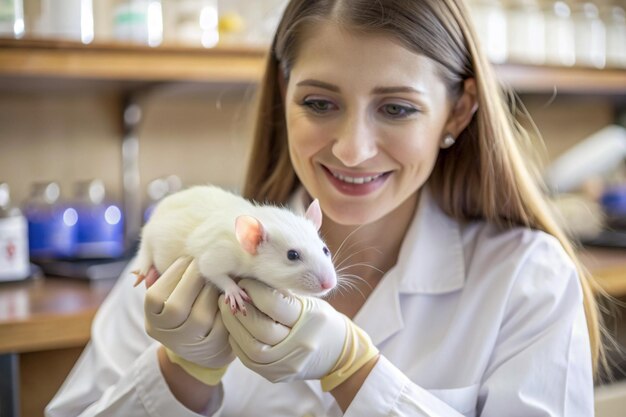
The Cost of Bringing Back Your Furry Friend: €45,000 to €70,000
Breakdown of the costs involved in pet cloning:
Pet cloning is a complex process that comes with a hefty price tag. Here’s a breakdown of the costs involved:
Collection and preservation of cells:
Collecting and preserving the necessary cells for cloning can be quite expensive. This may involve extracting semen from male pets or obtaining embryos from females before they are spayed. The cells must then be carefully preserved using specialized techniques to ensure their viability.
Cloning process itself:
The actual cloning process involves several steps, including the fusion of the donor cell with an enucleated egg cell from a surrogate mother, implantation of the embryo into the surrogate mother, and gestation until birth. Each step requires specialized techniques and equipment, driving up the cost.
Surrogate mother’s fees and care:
A surrogate mother is necessary for the cloning process, as the donor animal’s eggs cannot be used. The costs of finding and caring for a suitable surrogate mother, as well as any necessary veterinary care during the pregnancy, can add significantly to the overall cost.
Additional costs for veterinary care and transportation:
Once the cloned pet is born, additional costs may include veterinary care to ensure its health and wellbeing, as well as transportation costs if the pet needs to be transported long distances.
Comparison of pet cloning prices to other services offered by Gemini Genetics:
Compared to other services offered by link, pet cloning prices are quite high. For example,
DNA testing
costs around €100-€300 depending on the test, while a
health screening panel
can cost between €200 and €1,500. These services provide valuable information about a pet’s health and genetic background, but they do not involve the complexity and cost of creating an exact genetic copy of an animal.
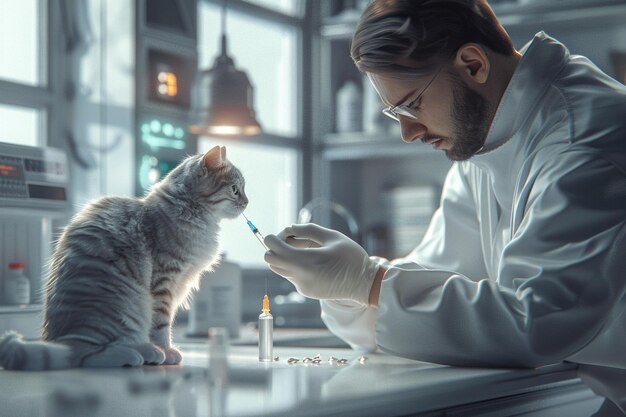
VI. Conclusion
In the realm of biotechnology, pet cloning has undeniably advanced to new heights with Gemini Genetics leading the way.
Advancements and Availability
Over the years, this groundbreaking company has successfully cloned several cats and dogs, including famous ones like Little Nicky and Scooter. Bold This scientific achievement, though expensive, is now within the reach of those who are willing to invest a substantial amount for a unique experience. However,
Ethical, Moral, and Financial Considerations
the process of bringing cats and dogs back to life raises numerous ethical, moral, and financial considerations. Ethically, questions around animal rights, euthanasia, and genetic manipulation arise. Morally, people debate on the implications of recreating a beloved pet versus creating a new life. Financially, the high cost deters many potential clients from considering this option.
Further Debate
It is essential to continue the discussion and debate on the implications of pet cloning for society, animal welfare, and personal reasons. Implications From a societal standpoint, pet cloning can potentially lead to increased demand for designer pets, further commodification of animals, and even potential exploitation. For animal welfare, there are concerns about the physical and emotional well-being of cloned pets, their longevity, and whether they lead happy lives. Lastly, on a personal level, pet cloning offers the opportunity for individuals to experience an emotional connection with their deceased pet once more.
Encouraging Dialogue
In conclusion, the availability of pet cloning technology through companies like Gemini Genetics has opened up a new realm of possibilities and ethical dilemmas. This paragraph serves as a call to action, encouraging further discussion, debate, and reflection on the societal, ethical, and personal implications of pet cloning.
Stay Informed
As technology continues to evolve, it is crucial for individuals to stay informed about the latest advancements and considerations surrounding pet cloning. Through open dialogue and a thoughtful approach, we can ensure that any developments in this area prioritize animal welfare, ethical standards, and the well-being of pets and their owners alike.




